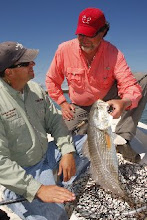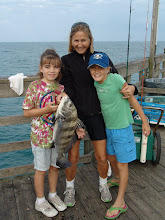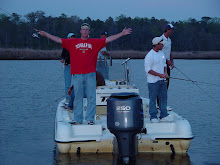CFRG ASKS LEGISLATORS TO HELP WITH TRAWLING ISSUE
The following letter was sent to North Carolina legislators today.
Recent studies by the North Carolina Division of Marine Fisheries have shown that approximately 78 percent (by weight) of what is caught in shrimp trawls is untargeted "by catch" that will die before being shoveled overboard. More shockingly, the annual by catch from NC shrimp trawlers consists of over 500 million individual small fish.
Most of these fish are croaker, spot and weakfish (grey trout). The combined total for these three species is approximaely 300 million fingerlings every year for the last five years. The biological affects of this yearly by catch are not officially known, but it is easy to see the real-life effects of this wanton waste.
Croaker and spot fishing were a traditional part of our coastal communities for generations, but these fish have markedly declined and no longer are an important part of our coastal culture. Pier and surf fishermen armed with bloodworms for catching plentiful spot once lined the shorelines from Nags Head to Wrightsville Beach but with the depletion of the spot, the pilgrimage to the beach has declined, taking with it the immense stimulus to local economies from visiting fishermen.
Weakfish (grey trout) were once abundant in our coastal waters, with coolers full of fish being a common daily catch, but they are now officially classified as depleted and are all but lost as a recreational target. Overfish of adult fish accompanied by the losses due to shrimp trawlers have decimated this once plentiful fish. The recreationl limit is now set at one fish per day which must be at least 12 inches in length - that's hardly a good day of fishing.
As other states outlawed or severly curtailed shrimp trawling in inshore water, the trawlers came to North Carolina. North Carolina remains the only state in the Southeast that has not greatly limited (or banned) shrimp trawling in their inshore waters. As the destruction of our marine fisheries persists and our fish populatons continue to decline, other states have built thriving fishereis that support an ever-growing legion of recreational fishermen who spend billions of dollars a year on their hobby.
For years, the North Carolina Marine Fisheries Commission and the North Carolina Division of Marine Fisheries have been aware of the problems caused by shrimp trawling but have chosen to ignore the issue. Shrimpers have the option of using less destructive and more targt-specifid gear, but with no restrictions forced by our fisheries managers, they have not changed their practices. All of this destruction occurs for a relatively small amount of shrimp (approximately 5 million pound in 2011), that supports a very small group of trawler owners.
The Coastal Fisheries Reform Group is asking the state's citizens and its elected representatives to step in and force changes to allow North Carolina's sounds to recover and grow back into what was once one of the greatest fisheries in the world. Thes problems can only be corrected with your help. Pleaser direct the Marine Fisheries Commission to address the shrimp trawl by catch problem by eliminating trawling our our inshore waters.
Most of these fish are croaker, spot and weakfish (grey trout). The combined total for these three species is approximaely 300 million fingerlings every year for the last five years. The biological affects of this yearly by catch are not officially known, but it is easy to see the real-life effects of this wanton waste.
Croaker and spot fishing were a traditional part of our coastal communities for generations, but these fish have markedly declined and no longer are an important part of our coastal culture. Pier and surf fishermen armed with bloodworms for catching plentiful spot once lined the shorelines from Nags Head to Wrightsville Beach but with the depletion of the spot, the pilgrimage to the beach has declined, taking with it the immense stimulus to local economies from visiting fishermen.
Weakfish (grey trout) were once abundant in our coastal waters, with coolers full of fish being a common daily catch, but they are now officially classified as depleted and are all but lost as a recreational target. Overfish of adult fish accompanied by the losses due to shrimp trawlers have decimated this once plentiful fish. The recreationl limit is now set at one fish per day which must be at least 12 inches in length - that's hardly a good day of fishing.
As other states outlawed or severly curtailed shrimp trawling in inshore water, the trawlers came to North Carolina. North Carolina remains the only state in the Southeast that has not greatly limited (or banned) shrimp trawling in their inshore waters. As the destruction of our marine fisheries persists and our fish populatons continue to decline, other states have built thriving fishereis that support an ever-growing legion of recreational fishermen who spend billions of dollars a year on their hobby.
For years, the North Carolina Marine Fisheries Commission and the North Carolina Division of Marine Fisheries have been aware of the problems caused by shrimp trawling but have chosen to ignore the issue. Shrimpers have the option of using less destructive and more targt-specifid gear, but with no restrictions forced by our fisheries managers, they have not changed their practices. All of this destruction occurs for a relatively small amount of shrimp (approximately 5 million pound in 2011), that supports a very small group of trawler owners.
The Coastal Fisheries Reform Group is asking the state's citizens and its elected representatives to step in and force changes to allow North Carolina's sounds to recover and grow back into what was once one of the greatest fisheries in the world. Thes problems can only be corrected with your help. Pleaser direct the Marine Fisheries Commission to address the shrimp trawl by catch problem by eliminating trawling our our inshore waters.
Relative biomass (kg) observed in all net types combined in the
commercial shrimp trawl fisheries in Pamlico Sound and its
tributaries, North Carolina, 1 July 2009 to 31 December 2009*
Common Name Total Number Total Weight % Biomass
Atlantic Croaker 787,633 18,367 33
Brown Shrimp 511,395 11,608 21
Spot 404,076 7,029 13
Weakfish 213,578 3,530 6
Total ………………………………........................................... 73
*This table was derived from: “ INTERSTATE FISHERIES MANAGEMENT PROGRAM IMPLEMENTATION FOR NORTH CAROLINA By Kevin Brown. Completion Report for NOAA Award No.
NA05NMF4741003. Study II DOCUMENTATION AND REDUCTION OF BYCATCH IN NORTH
CAROLINA FISHERIES. JOB 2: Characterization of the inshore commercial shrimp trawl fishery in Pamlico Sound and its tributaries, North Carolina June 2010”


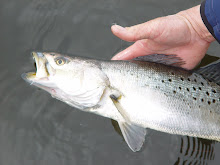



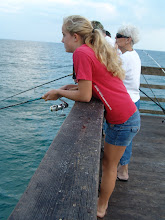

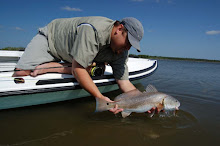.jpg)


